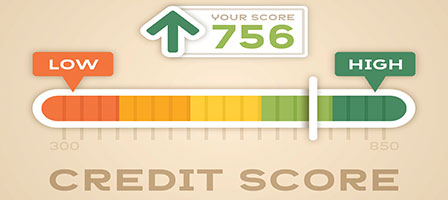How to Improve Your Credit Score
 There are myriad important numbers in your financial world, but few as critical as your credit (FICO®) score. This FICO® number, ranging from 300-850, can affect your ability to buy a house or car, get a credit card or other loan, or even get a job sometimes. Your FICO® score also affects the interest rates on loans.
There are myriad important numbers in your financial world, but few as critical as your credit (FICO®) score. This FICO® number, ranging from 300-850, can affect your ability to buy a house or car, get a credit card or other loan, or even get a job sometimes. Your FICO® score also affects the interest rates on loans.FICO® scores are based on your credit reports. Credit agencies track credit history and sell it to parties who are interested in your credit-worthiness. Credit reports consist of four elements:
• Personal information (compiled from credit applications)
• Credit history (details of your credit relationships)
• Credit report inquiries (entered anytime someone views your record)
• Public records (judgments from government sources, like liens)
Three agencies track credit scores: Equifax, Experian, and TransUnion. You're entitled to a free report once every 12 months; the best place to get this is AnnualCreditReport (www.annualcreditreport.com). You can:
• See who's been making inquiries about your credit
• Check it for errors
• Find out if you're an identity theft victim
• Gauge your chances of getting a loan
A bad credit report doesn't have to follow you forever. Even bankruptcies generally drop off after seven years. If your score is less than optimal, you can improve it. Stick with your program and you'll increase your chances of--eventually--getting into that top 5%, or even 1%.
• Report mistakes immediately to the appropriate credit agency. Do this in writing, and document it well.
• Pay everything on time. Even one late payment on a credit card can lower your credit score.
• Budget your credit card payments. They should be as much a part of your budget as your mortgage and food.
• Don't let balances on your revolving credit accounts--like credit cards--get too high. Having a high credit debt-credit limit ratio can lower your credit score.
• Neither close your unused accounts nor open new accounts to affect your credit score. That trick doesn't always work.
• Pay off the cards with the highest interest rate first. No matter what the balance, you should always pay any extra you have on the card that's costing the most. Pay minimums on the rest. When you have that top card paid off, continue the process with the second in line, and so on. Whenever you can, pay more.
• Keep an emergency reserve so you can always pay at least minimums on time. Don't be intimidated by this. If you can't save thousands of dollars, at least squirrel away a few hundred earmarked for this occasion. Skip purchasing a couple of lattes every paycheck and bank it.
• Ask your credit card issuer for a lower rate. This actually works sometimes, so it's worth a try. Credit card interest is simply lost money.
• Use your credit cards occasionally and carefully. Show that you can borrow money and pay it back responsibly.
• Don't be a ostrich. The credit bureau can't gauge your ability to pay a debt back if you don't ever borrow any.
• Try to maintain a stable job and residence. Lenders are more interested in people who show stability in their personal lives.
• Avoid--like the plague--collection agencies and judgments against you. When you've satisfied a lien, be sure to check that the lien has been released and report that to the three reporting agencies if necessary.
What happens if your credit is really in shreds? Double your determination and keep following your program. If you can't get a traditional credit card, get a secured credit card, where you make a cash deposit and can charge up to that limit. Pay it off faithfully, and you'll probably eventually get credit again.
In the meantime, save as much as you can so you don't trash your credit again. Consider asking someone to co-sign a small loan so you can prove you're worthy of credit.
When you are, shop for your credit cards like you shop for groceries and clothing, to find the best deal. Bankrate.com (www.bankrate.com) is a good place to do that. That's a good site for finding the best deals on other financial products, too, like mortgages and other loans.
Improving your credit score will likely take time and some sacrifice on your part. But it's worth it, and it'll save you money eventually -- the higher the FICO score, the better your chance of credit and loans, and the lower your interest rate may be. So keep plugging towards the payoff.
|
|  |





